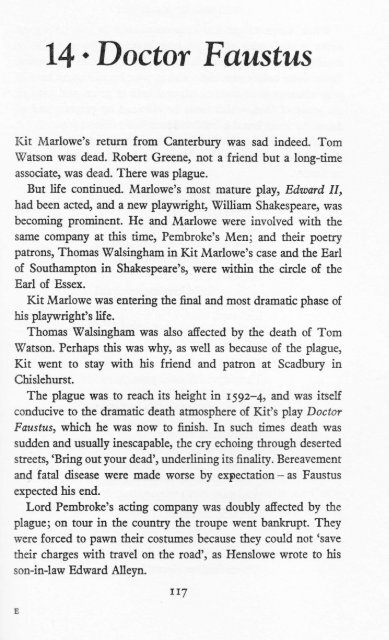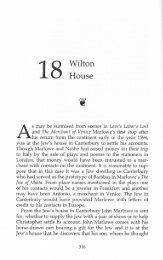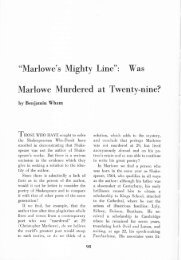L4.Doctor Faustus - The Marlowe Studies
L4.Doctor Faustus - The Marlowe Studies
L4.Doctor Faustus - The Marlowe Studies
Create successful ePaper yourself
Turn your PDF publications into a flip-book with our unique Google optimized e-Paper software.
<strong>L4.Doctor</strong> <strong>Faustus</strong><br />
Kit <strong>Marlowe</strong>'s return from Canterbury was sad indeed. Tom<br />
Watson was dead. Robert Greene, not a friend but a long-time<br />
associate, was dead. <strong>The</strong>re was plague.<br />
But life continued. <strong>Marlowe</strong>'s most mature play, Edward II,<br />
had been acted and a new playwright, William Shakespeare, was<br />
lggsming prominent. He and <strong>Marlowe</strong> were involved with the<br />
same company at this time, Pembroke's Men; and their poetry<br />
patons, Thomas Walsingham in Kit <strong>Marlowe</strong>'s case and the Earl<br />
of Southampton in Shakespeare's, were within the circle of the<br />
Earl of Essex.<br />
Kit <strong>Marlowe</strong> was entering the fnal and most dramatic phase of<br />
his playwright's life.<br />
Thomas lValsingham was also affected by the death of Tom<br />
Watson. Perhaps this was why, as well as because of the plague,<br />
Kit went to stay with his friend and patron at Scadbury in<br />
Chislehurst.<br />
<strong>The</strong> plague was to reach its height in ry92-4, and was itself<br />
conducive to the dramatic death atmosphere of Kit's play Doctor<br />
<strong>Faustus</strong>, which he was now to finish. In such times death was<br />
sudden and usually inescapable, the cry echoing through deserted<br />
streets,'Bring out your dead', underlining its finality. Bereavement<br />
and fatal disease were made worse by expectation - as <strong>Faustus</strong><br />
expected his end.<br />
Lord Pembroke's acting company was doubly affected by the<br />
plague; on tour in the country the troupe went bankrupt. <strong>The</strong>y<br />
were forced to pawn their costumes because they could not 'save<br />
their charges with travel on the road', as Henslowe wrote to his<br />
son-in-law Edward Alleyn.<br />
t17
WHO WAS KIT MARLOWE?<br />
$[hen Alleyn was on tour he wrote to his wife ]oan ('My good<br />
sweet mouse') with advice on how death by plague might be<br />
avoided. 'Keep your house fair and clean. . . and every evening<br />
throw water before your door, and in your backsidq and have in<br />
your windows good store of rue and herb of grace, and with all<br />
the grace of God, which must be obtained by prayers; and so<br />
doing, no doubt but the Lord will mercifully defend you. . .'<br />
Kit's friend Thomas Nashe wrote a haunting poem about the<br />
plague, with the repeated line'I am sick I must die', emphasizing<br />
its finality.<br />
Adieu, farewell earth's bliss,<br />
This world uncertain is;<br />
Fond are life's lusdul ioys,<br />
Death proves them all but toys,<br />
None from his darts can fly.<br />
I am sick, I must die.<br />
Lordhave mercy on us!<br />
Rich men, trust not in wealth,<br />
Gold cannot buy you health;<br />
Physic himself must fade'<br />
All things to end are made.<br />
<strong>The</strong> plague full swift goes by;<br />
I am sick, I must die.<br />
Lordhave mercYon us!<br />
Beauty is but a flower<br />
Which wrinkles will devour:<br />
Brightness falls from the air,<br />
Queens have diedyoung and fair,<br />
Dust hath closed Helen's eYe.<br />
I am sick, I must die.<br />
Lord have mercy on us !<br />
Strength stoops unto the grave'<br />
Sflorms feed on Hector brave,<br />
DOCTORFAUSTUS<br />
Swords may notfight with fate.<br />
Earth still holds ope her gate;<br />
Come ! come ! the bells do cry.<br />
I am sicls I must die.<br />
Lord have mercy on us !<br />
Wit with his wantorutess<br />
Tasteth death's bitterness;<br />
Hell's executioner<br />
Hath no ears for to hear<br />
$fhat vain art can reply.<br />
I am sick, I must die.<br />
Lord have mercy on us !<br />
Haste, therefore, each degree,<br />
Towelcome destiny.<br />
Heaven is our heritage,<br />
Earth but a player's stage;<br />
Mount we unto the sky.<br />
I am sick,I must die.<br />
Lord have mercy onus!<br />
Inescapability was much stressed at ttris time. In Act r of<br />
<strong>Faustus</strong>, Kit <strong>Marlowe</strong> had written:<br />
lfhat doctrine call you this? Che sera sera:<br />
What will be, shall be! Divinity, adieu!<br />
and this Itdian proverb, without <strong>Marlowe</strong>'s translation but with<br />
'divinity, adieu', was quoted ascribed to <strong>Faustus</strong>, among margin<br />
notes in Thomas Nashe's handwriting in a book by John Leland.<br />
<strong>The</strong> book was published in 1589 but it is not known when Nashe<br />
made the notes. Nashe's interest in <strong>Faustus</strong> points to his involvement<br />
with <strong>Marlowe</strong> at this time, particularly as Nashe was<br />
another of those warned by Greene's deathbed repentances,<br />
which made a deep impression on <strong>Marlowe</strong> when he was completing<br />
Doctor <strong>Faustus</strong>.<br />
r18 I19
WHO WAS KIT MARLOWE?<br />
Kit's decision to finish Doctor <strong>Faustus</strong> was encouraged by<br />
a translation of the Historia oon D.lohan Faasten (published in<br />
Franldurt by an anonymous Lutheran in 1587), appearing in<br />
England in rygz.Its tide page read: 'THE HISTORIE of the<br />
damnable life, and deserved death of Doctor ]ohn <strong>Faustus</strong>, Newly<br />
imprinted and in convenient places imperfect matter amended:<br />
according to the true Copie printed at Franldort, and translated<br />
into English by P. F. Gent. Seene and allowed. Imprinted by<br />
Thomas Orwin and to be solde by Edward White, dwelling at<br />
the little North doore of Paules, at the signe of the Gun. r5g2-'<br />
<strong>The</strong> translator 'P. F.' has not been identified and 'newly imprinted'<br />
suggests an earlier edition. This did not refer to 'A ballad<br />
of the life and deathe of Doctor FFAUSTUS the great Cunngerer',<br />
which was entered in the Stationers'Register on z8 February<br />
1589 (though it would be interesting to learn about this lost<br />
work), but is explained by a court battle berween Abell Jeffes and<br />
Tho. Orwin about the copyright of the German translation. As<br />
Tho. Orwin's edition was to be sold by Edward \ilfhite, rwo of<br />
the same protagonists were involved as in a disagreement over<br />
the printing of Thomas Kyd's <strong>The</strong> Spanish Tragedy. Orwin<br />
claimed that 'one Richard Oliff' had entered the book in the<br />
Stationers' Register; but the court ruled that if the book had not<br />
been entered 'before Abell Jffs clamed the same w"h was about<br />
May last', then Jeffes held the copyright. This was so, and the<br />
earlier edition from which the 'imperfect matter' was amended<br />
was tlat of Jeffes.<br />
Court cases like this were frequent as Elizabethans were given<br />
to litigation - and to street fighting. When Kit <strong>Marlowe</strong> is thought<br />
lawless @ecause of his three court appearances), the record of<br />
some other Elizabethans should be remembered. Ben lonson, for<br />
example, killed a man (the victim being confused with 'Mr<br />
Marlow' by lohn Aubrey) and among other brushes with the<br />
law was imprisoned with Nashe for writing 'seditious material'.<br />
Kit <strong>Marlowe</strong> barely drew blood; he was rescued by S7atson in the<br />
Hog Lane fight, and was reconciled with Corkine in Canterbury<br />
r20<br />
DOCTOR F.4USTUS<br />
after no injury had been done. By Elizabethan standards he was<br />
fairly gentle.<br />
Much of Kit <strong>Marlowe</strong>'s Doctor <strong>Faustus</strong> was based on P. F.'s<br />
translation. While Kit could have read the original German<br />
boo\ and no doubt saw 'A Ballad of the life and deathe of Doctor<br />
FFAUSTUS the great Qunng€rer'5 there are many parallels between<br />
his play and the translated Damnable Life. So although<br />
Kit rewrote parts to round the play's structure, and though historical<br />
references, for example the 'fiery keel', point to work<br />
done in Armada time, the play relies mainly on the Damnable<br />
Life. Comparison of the prologues of <strong>Marlowe</strong>'s '<strong>The</strong> Tragical<br />
History of the Life and Death of Doctor <strong>Faustus</strong>' and the translated<br />
'Historie of the Demnable Life, and Deserved Death<br />
of Doctor John <strong>Faustus</strong>' by P. F. demonstrates tle way Kit<br />
<strong>Marlowe</strong> absorbed this material.<br />
Not marchingin the fields of Trasimene<br />
$fhereMars did mate the warlike Carthagens,<br />
Nor sporting in the dalliance of love<br />
In courts of kings where state is overhrrn'd<br />
Nor in the pomp of proud audacious deeds<br />
Intends our muse to vaunt his heavenly verse:<br />
Only this, gendes - we must now perform<br />
<strong>The</strong>form of <strong>Faustus</strong>'fortunes, good orbad:<br />
And now to patient iudgements we apped,<br />
And speak for <strong>Faustus</strong> in his infancy.<br />
Now is he born, of parents base of stock,<br />
In Germany, within a town call'd Rhode;<br />
At riper years to \[ittenberg he went,<br />
Whereas his kinsmen chiefly brought him up.<br />
So much he profits in divinity,<br />
<strong>The</strong> fruidul plot of scholarism grac'd,<br />
That shortly he was grac'd with doctor's name,<br />
Excelling all, and sweetlycan dispute<br />
In th'heavenly matters of theology;<br />
t2t
WHO WAS KITMARLOWE?<br />
Till, swollen with cunning of a self-conceit,<br />
His waxen wings did mount above his reach,<br />
And melting heavens conspir'd his overthrow;<br />
For, falling to a devilish exercise,<br />
And gutted now with learning's golden gifts,<br />
He surfeits upon cursed necromancy;<br />
Nothing so sweet as magic is to him,<br />
$7hich he prefers before his chiefest bliss:<br />
And this the man that in his study sits.<br />
Far*tus, Prologue, rr-27,<br />
D.L., i. Iohn <strong>Faustus</strong>, borne in the town of. Rhoile' lying in the<br />
Prouince of Veimer in Germlonie,] his father a poore Husbandman,<br />
and not lable] wel to bring him vp: but hauing an Uncle atVfittenberg,<br />
a rich man, & without issue, took this I. Fanstus from his father,<br />
& made him fuis heire, in so much that his father was no more troubled<br />
with him, for he remained with his Uncle at Vittenberg, wbere he<br />
was kept at y€ Uniuersitie in the same citie to study diuinity. But<br />
<strong>Faustus</strong> being of a naughty minde & otherwise addicted applied not<br />
his studies, but tooke himselfe to other exercises . . . he gaue himself<br />
secredy to study Necromancy and Coniuration, in so much that few<br />
or none could perceiue his profession.<br />
But to tle purpose: <strong>Faustus</strong> continued at study in the UniuersitS<br />
& was by the Rectors and sixteene Masters afterwards examined howe<br />
he had profited in his studies; and being found by them, that none<br />
for his time were able to argue with him in Diuinitg or for the excellency<br />
of his wisedome to compare with him, with one consent they<br />
made him Doctor of Diuinitie.<br />
D.L., ii. You haue heard before, that all Faustns minde was set to<br />
study the artes of Necromancie and Coniuration, the which exercise<br />
hee followed day and night: and taking to him the wings of an Eagle,<br />
thought to flie ouer the whole world, and to know the secrets of<br />
heauen and earth; for his Speculation was so wonderfull, being expert<br />
in vsing his Vocabula, Figures, Characters, Coniurations, and<br />
other Crremoniall actions.<br />
<strong>The</strong> first six lines of <strong>Marlowe</strong>'s Frologue are in the vein of<br />
his Prologue to Tamburlaine, except for the reference to<br />
r22<br />
DOCTOR F/USTUS<br />
Edward II ('the dalliance of love In courts of kings'), which could<br />
have been added later, and <strong>Faustus</strong>'s humble birth is noted before<br />
it is stated that he was born in Rhodes. <strong>Marlowe</strong> does not say<br />
directly that <strong>Faustus</strong>'s relative who paid for his education was<br />
his uncle, but calls him his kinsman who 'brought him up'; as<br />
<strong>Marlowe</strong> also had an uncle who helped with his education<br />
(Thomas Arthur) but who did not bring him up, he is not stressing<br />
the likeness between his own background and that of <strong>Faustus</strong>.<br />
<strong>Marlowe</strong> adapted 'the wings of the eagle' in the third paragraph<br />
of. rhe Darnnabte Life to the Icarus story of melting wings (which<br />
was also applied by Talbot to his son inHenry 7I, Part One).<br />
<strong>Faustus</strong> is related to Tambwlaine because it is another grand<br />
theme. Tamburlaine is 'the scourge of God' and <strong>Faustus</strong> a man<br />
in revolt against God. Bottr are eventually punished.<br />
In its way, <strong>Faustus</strong> is Kit <strong>Marlowe</strong>'s complement to Tamburlaine.<br />
Tamburlaine conquered the known world and then death<br />
conquered hirn. <strong>Faustus</strong> conquered the supernatural world by<br />
selling his soul to Mephistophilig but was a complete loser because<br />
he could not regain his soul.<br />
One difierence between <strong>Marlowe</strong>'s play and the Damnable<br />
Life is the presence in the former of angels, who reason with<br />
<strong>Faustus</strong>. <strong>The</strong> German Faust book was a dour story, as Lutheranism<br />
usually was, and unembellished. As Kit's Tambutlaine bad<br />
been full of the heavens, the stars and the angels ('now walk the<br />
angels on the walls of heaven') this sparHe continued into Fczsfts.<br />
ffi6ugh a condemned sinner, <strong>Marlowe</strong>'s Fausttts saw glories and<br />
wonders during his lost years.<br />
<strong>The</strong> parade of the Seven Deadly Sins in <strong>Marlowe</strong>'s Doctor<br />
<strong>Faustus</strong> is not taken from the Damnable Life.Tttts has a medieval<br />
atmosphere as well as being reminiscent of Greene's last warning.<br />
<strong>The</strong> sins were often represented pictorially, and are aptly placed<br />
in this part of the development of the <strong>Faustus</strong> story. As with his<br />
adaptation of Holinshed's chronicle for Edward II, Kit' <strong>Marlowe</strong><br />
was becoming adept at marshalling material.<br />
r23
WHO WAS KIT MARLOWE?<br />
When Kit <strong>Marlowe</strong> is anti-clerical it is usually the Catholics<br />
he attacks. In Edward I/ the bishops were regarded as people<br />
worthy of respect and Gaveston's behaviour to them as wrong.<br />
<strong>The</strong> Pope receives no such respect from Doctor Fausfus. However,<br />
as the German Faust book had been compiled by an antipaplst<br />
Lutheran, <strong>Marlowe</strong> is less brutal to the Pope in his play<br />
than the Lutheran had been. <strong>Marlowe</strong>'s <strong>Faustus</strong> makes some ioke<br />
about the Pope's crossing himself ('Must every bit be spiced with<br />
a cross') and then'hits him a box of the ear'. <strong>The</strong> Lutheran's<br />
<strong>Faustus</strong>'smote'the Pope bn the face'. In bodr, <strong>Faustus</strong> is cursed<br />
with bell, book and candle.<br />
Occasionally Kit <strong>Marlowe</strong>'s classicism breaks through. Horns<br />
are made to grcw on Benvolio's head in both versions, but Kit<br />
<strong>Marlowe</strong> likens him to'bold Actaeon'. Shakespeare later borrowed<br />
this incident in<strong>The</strong> Merry Vfues of Vindsor, and acknowledged<br />
Kit <strong>Marlowe</strong> by misquoting his lyric 'Come Live With Me and<br />
Be My Love'.<br />
Helen of Troy is in both versions, but while Kit <strong>Marlowe</strong> wrote<br />
most beautiful verse about her, the Damnable Lif e wu initially<br />
more prosaic and later insulting. <strong>The</strong> Damnable Life says 'fayre<br />
Helena of Greece. .. wils more than commonly fayre, because<br />
when she was stolne away from her husband, there was for her<br />
recovery so great bloodshed. . .' and '. . . he [<strong>Faustus</strong>] called his<br />
Spirit Mephistophiles, commanding him to bring him the faire<br />
Helena, which he also did. $fhereupon he fel in love with her,<br />
& made her his common Concubine & bedfellow, for she was so<br />
beautiful and delighdul a peece, that he could not be one houre<br />
from her. . .' Kit <strong>Marlowe</strong> wrote:<br />
SPas this the face that launch'd a thousand ships<br />
And burnt the topless towers of lllium? . . .<br />
I will be in Paris, and for love of thee<br />
Instead of Troy shall $Tittenberg be sack'd . . .<br />
Oh thou artfairer than the evening's air<br />
Clad in the beauty of a thousand stars . . .<br />
DOCTOR F,4USTUS<br />
Vhen <strong>Faustus</strong> approaches the time of retribution Kit <strong>Marlowe</strong><br />
wrote some of the greatest dramatic poetryin the English language.<br />
<strong>The</strong> inevitable is brought terrifyingly close by the clock striking<br />
eleven.<br />
Ah, <strong>Faustus</strong>,<br />
Now hast fhou but one bare hour to live,<br />
And then thoumustbe damn'd perpetually.<br />
Stand still, you ever-moving spheres of heaven,<br />
That time may cease, and midnight never come . . .<br />
<strong>The</strong> stars move still, time runs, the clock will strike. . .<br />
O, I'llleap up to my God ! Who pulls me down?<br />
See, see where Christ's blood streams in the firmament !<br />
One drop would save my soul, half a drop . . .<br />
Where is it now? 'Tis gone: and see where God<br />
Stretcheth out his arm and bends his ireful brows.<br />
Mountains and hills, come, come, and fall on me'<br />
And hide me from the heavy wrath of God! . . .<br />
No, no!<br />
<strong>The</strong>n will I headlong run into the earth.<br />
Eartl, gape ! O, no, it will not harbour me.<br />
You stars that reign'd at my nativity,<br />
Whose influence hath allotted death and hell,<br />
Nowdraw up <strong>Faustus</strong> like afoggymist<br />
Into the entrails of yon labouring cloud . . .<br />
O, it strikes, it strikes ! Now, body, turn to air'<br />
Or Lucifer will bear thee quick to hell !<br />
(Thunder andlighming)<br />
O soul, !s sfoeng'dintolittle water dmps,<br />
And fall into the ocean, ne'et be found.<br />
(Enter devils.)<br />
My Go4 my God ! Look not so fierce on me !<br />
Adders and serpentsr letme breathe awhile !<br />
Ugly hell, gape not ! Come not, Lucifer;<br />
r24 r25
WHO WAS KIT M.ARLOWE?<br />
I'll burn my books ! -<br />
(Exeuntwithhim.)<br />
Ah, Mephistophilis !<br />
Significandy this complements T amburlaine.'Smile, stars that<br />
reiga'd at my nativity' becomes 'You stars that reign'd at my<br />
nativity'. 'And set black streamers in the firmament' becomes<br />
'See, see where Christ's blood streams in firmament'. 'Wrapt in<br />
the bowels of a freezing cloud' becomes 'Now draw up <strong>Faustus</strong><br />
like a foggy mist/Into the entrails of yon labouring cloud'.<br />
<strong>Faustus</strong>'s last-breath offer to burn his books is like Shakespeare's<br />
Prospero breaking his staff in <strong>The</strong> Tempest, though<br />
Prospero succeeded where <strong>Faustus</strong> failed. Doctor Fanstus has a<br />
deeper theme than <strong>The</strong> Tempest, but it is interesting to compare<br />
Shakespeare's magician with <strong>Faustus</strong>. Some think that Prospero<br />
was more like Dr John Dee than <strong>Faustus</strong>, but this is to judge Dee<br />
with hindsight. <strong>The</strong> reactions of Elizabethans to him were more<br />
those of the public to <strong>Faustus</strong> who'deserved punishment', and Dee<br />
had his library of rare books at Mordake burned by frightened<br />
crowds. <strong>Marlowe</strong> may be referring to this.<br />
<strong>The</strong> Tempesf was the most Rosicrucian of Shakespeare's workg<br />
and was one of the plays performed in May 1613 for King lamgs'g<br />
daughter and her husband the Prince Palatine Elector, who were<br />
involved with the Rosicrucian movement. <strong>The</strong> Tempesl in a<br />
gentler way complements <strong>Marlowe</strong>'s <strong>Faustus</strong>, as, written eighteen<br />
years later, it could view the rumbustious r59os with detachment.<br />
Though incorporating some of the attributes of the masque,<br />
which <strong>Marlowe</strong>'s plays never di{ the spirits of these sequences<br />
are related to the spirits of <strong>Faustus</strong>, but are classical while <strong>Marlowe</strong>'s<br />
were Christian. Judged by the religion of the time,<br />
<strong>Marlowe</strong>'s <strong>Faustus</strong> was not atheistic, and Kit <strong>Marlowe</strong> is in the<br />
same danger as Dr John Dee of being misjudged by hindsight.<br />
Though <strong>Marlowe</strong> was in many ways a Renaissance man, Shakespeare's<br />
<strong>The</strong> Tempest is more Renaissance, md <strong>Marlowe</strong>'s<br />
Fau.stus is more medieval. Marl.owe's <strong>Faustus</strong> is also more medieval<br />
than the Lutheran Damnable Life.<br />
rz6<br />
DOCTORFAUSTUS<br />
Brought up in a cathedral city, and educated at King's School,<br />
anached to the cathedral, and at tradition-bound Cambridge, Kit<br />
<strong>Marlowe</strong> knew more of the medieval heritage than did Shakespeare<br />
or Jonson, and so did his friend Thomas Nashe, who had<br />
<strong>Marlowe</strong> so much in mind at this time. It is therefore not surprising<br />
that Shakespeare's play is the less Christian of the two. <strong>The</strong><br />
Tempest is an agreeable fable and surprisingly echoes not only<br />
<strong>Faustus</strong> but Tambwlaine. For example:<br />
Over my zenith hang a blazing star (Tambulaine,<br />
Part Two, Act rn)<br />
becomes b <strong>The</strong> Tempest<br />
I find my zenith doth depend upon<br />
A most auspicious star . . .<br />
(<strong>The</strong> Tempesf, Actr)<br />
Ben Jonson's Alchemist is a different character, though descended<br />
from the Dr John Dee image. S(rorldly-wise Jonson<br />
knew about frauds, fakes and human gu[ibility. <strong>Marlowe</strong> and<br />
Shakespeare treated <strong>Faustus</strong> and Prospero with respect, even<br />
aftection, and gave them, even <strong>Faustus</strong>, a kind of integrity. Ben<br />
]onson's world is one of greedy people who deserved to be<br />
laughed at.<br />
It was Jonson's image that persisted through a whole string of<br />
funny plays about phoney alchemists, though none with the<br />
authority of Jonson's original. Perhaps there was no one of<br />
sufficient ability to emulate <strong>Marlowe</strong> and Shakespeare. Hindsight<br />
has been right to redress the balance in Dr John Dee's favour;<br />
but it has wrongly given him twentieth-century understanding.<br />
Doctor <strong>Faustus</strong>, more than Kit <strong>Marlowe</strong>'s other plays, demonstrates<br />
the promise yet to come. !7hat would he have written in<br />
16r r, when Shakespeare was composing <strong>The</strong> Tempest?<br />
As it was, his personal tragedy was drawing inexorably closer.<br />
r27






